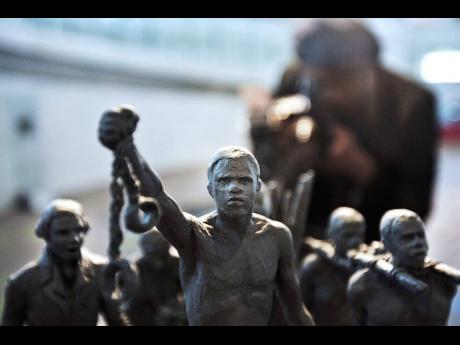Peter Espeut | Assessing CARICOM demands for reparations
There was a kerfuffle this week as outgoing British High Commissioner Asif Ahmad was blunt enough to state that while the legacy of slavery was abhorrent, “the issue of reparations will not prosper because we do not have a policy of paying to...
There was a kerfuffle this week as outgoing British High Commissioner Asif Ahmad was blunt enough to state that while the legacy of slavery was abhorrent, “the issue of reparations will not prosper because we do not have a policy of paying to people who are no longer alive”. This statement by a diplomat speaking on behalf of his government has offended some people, who have been lobbying European governments to pay reparations to the descendants of enslaved Africans and victimised indigenous communities.
Over the last 30 years in this column, I have been consistent in asserting that those who perpetrated the slave trade and slavery itself are guilty of heinous crimes against humanity and owe a huge debt to those affected and their descendants. The fact that the slave owners (the perpetrators) were compensated for the loss of their human ‘property’ – which they never had a right to in the first place – while those set free (the victims) were given nothing in compensation for being kidnapped from their homeland, transported thousands of miles away, and stripped of their culture and dignity, is morally reprehensible.
The British government borrowed the £20 million they used to compensate the slave owners (equivalent to about £17 billion today) and only finished paying it off in 2015, which means that British taxpayers now alive – including descendants of slaves – helped to repay the reparations to those who enslaved their long-dead ancestors.
I have been equally consistent over the last 30 years in asserting that it would be a travesty of justice for any of the reparations money to be paid to the Jamaican government – or any government – who themselves owe their people reparations for hijacking their political independence.
To make my case, I wish to analyse the CARICOM 10-point plan for reparatory justice prepared by the CARICOM Reparations Commission (CRC) and agreed to by CARICOM governments.
SEEK REPARATIONS
In the preamble they make it clear that they seek reparations, not only for human trafficking and slavery itself, but for the legacy of colonialism as well. The CRC asserts that European Governments:
“Imposed a further one hundred years of racial apartheid upon the emancipated” and “imposed for another one hundred years policies designed to perpetuate suffering upon the emancipated and survivors of genocide”.
The CRC seeks reparations from European countries for the failure of independent CARICOM states to achieve economic and social development:
“The CRC sees the persistent racial victimisation of the descendants of slavery and genocide as the root cause of their suffering today. The CRC recognises that the persistent harm and suffering experienced today by these victims as the primary cause of development failure in the Caribbean”.
In doing so, they rubbish the claims by generations of social scientists who blame the present underdevelopment of Jamaica and the Third World on the hegemony of the United States of America, the capitalist system, and the “world system”, including the World Bank and the International Monetary Fund (IMF).
Because “the primary cause” of our underdevelopment today lies in the actions of Europeans, this lets the United States, the IMF and the World Bank off the hook. And of course, it makes our crop of politicians since independence (of both stripes) blameless for our poor education system and high illiteracy rates, blameless for the formation of garrisons and our high crime rates, and blameless for unsustainable development and the degradation of our natural environment.
MONEY OWED TO BLACK PEOPLE
No wonder that Jamaican politicians from both sides support European governments paying them the reparations money owed to black people.
Never mind that other governments in the Caribbean with the same history of debilitating slavery and colonialism have a better record of delivering education to their citizens, have much lower crime rates, and have healthier natural environments.
And so whereas I support the analysis that European governments and their private sectors supported the slave trade and slavery, and inflicted a debilitating colonialism on territories like Jamaica, and therefore have incurred a debt to the descendants of the enslaved, the analysis of the CRC is unbalanced because it does not give enough blame and responsibility for our underdevelopment on the evil world economic system and the cupidity of our own politicians and private sector.
The CARICOM Reparations Commission needs to wheel and come again, and to propose a path to economic and social development for our nations based on a more holistic analysis. In the end, our economic and social progress must be the result of our own salutary efforts, rather than waiting on Europe to intervene, no matter how guilty they may be.
The 10 points in the CARICOM Reparatory Justice Programme deserve specific comment. More anon.
Peter Espeut is an environmentalist and development scientist. Send feedback to columns@gleanerjm.com


